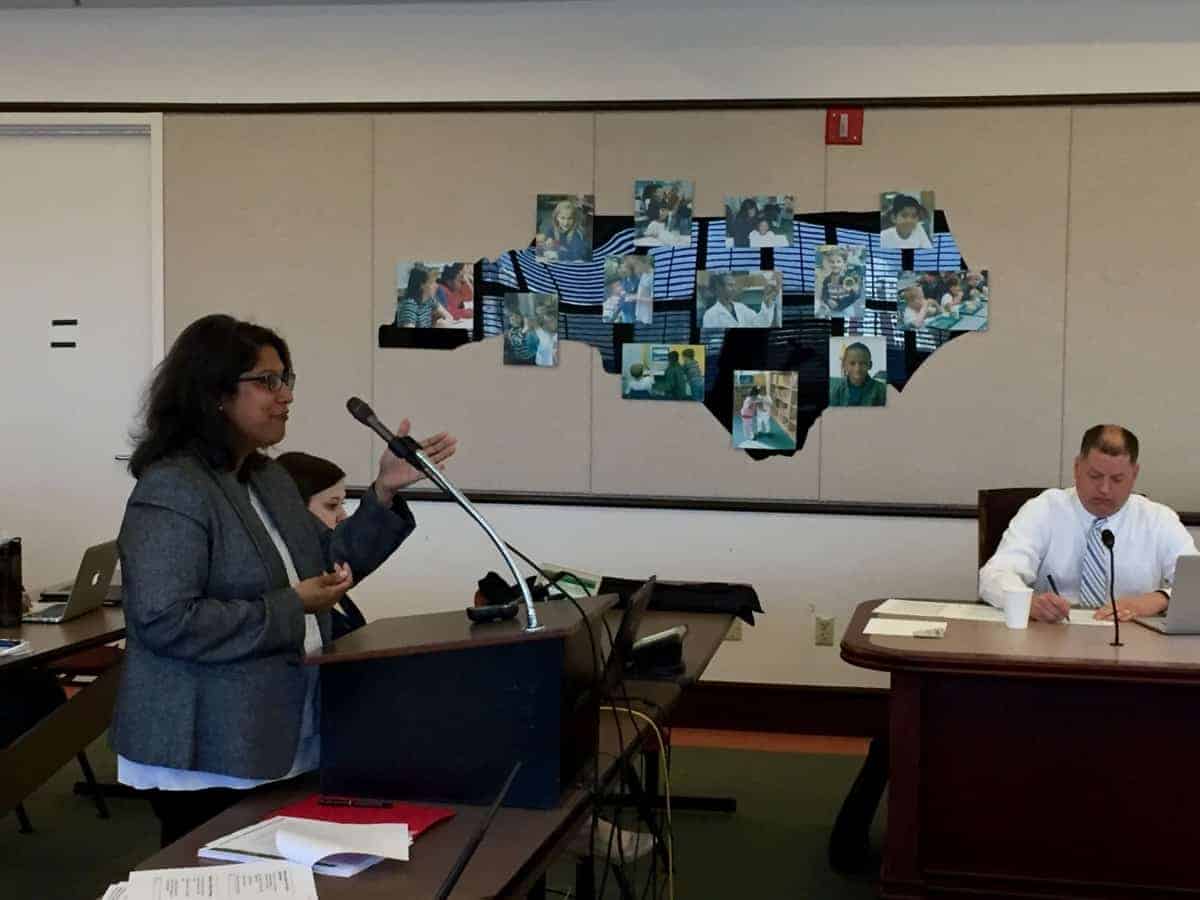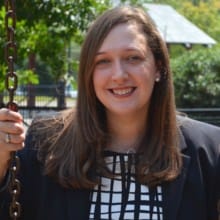Deans from some of the state’s schools of education expressed reservations about a new policy that allows teachers to take a test to get an add-on Academically and Intellectually Gifted (AIG) license rather than taking coursework at Institutes of Higher Education (IHEs).
Director of Advanced Learning and Gifted Education Sneha Shah-Coltrane presented to the Professional Educator Preparation and Standards Commission on Thursday. She outlined the new policy which allows candidates to take the Gifted Education Praxis test which has been used in 12 other states in the last three years.
Commission member Van Dempsey, dean of the Watson College of Education at UNC-Wilmington, said the test is not designed to be a standalone, but instead is intended to be complementary to coursework. Shah-Coltrane said she advocated for the Board not to add the Praxis requirement to the existing AIG programs, but instead to offer the assessment as a separate pathway to licensure.
“I always worried about a test-only kind of model,” said commission member Ellen McIntyre, dean of the Cato College of Education at UNC-Charlotte. “When we are talking about performance, and we are with the teachers, then I really think you have to have some kind of credit hours.”
McIntyre said there is a need to incorporate disposition and a multiple choice test does not do that sufficiently. Shah-Coltrane said disposition was a consideration and the department is pleased with how Praxis addressed that concern.
The commission has to be very careful about not imposing requirements for AIG that exceed the requirements for EC or ESL licensure, said commission member Glenda Jones, assistant superintendent of Cabarrus County Schools.
Commission member Michael Maher, assistant dean for Professional Education and Accreditation at N.C. State University College of Education, said he agreed with the concerns raised by his colleagues at other institutions of higher education, but he believed all the add-on licenses need to be in line with the requirements of other licensing.
School districts who are in need of more AIG licensed teachers can and should work with the Institutes of Higher Education, said commission member Ann Bullock, dean of the School of Education at Elon University.
Commission chair Patrick Miller, superintendent of Greene County Schools, said the recommendations of the commission on the AIG add-on are only relevant if the State Board wants to consider changes. Commission members indicated a desire to consider the AIG add-on as part of other considerations about licensure.
Commission member Andrew Lakis, executive director of Teach For America — Eastern North Carolina, encouraged an examination of datasets over the next few years with particular attention to underrepresentation of students of color in AIG programs.
Policy recommendations
The commission sent three policies to the State Board for consideration. The first addressed cut scores for pedagogy assessments. The commission considered a change in testing of teacher candidates in Educator Preparation Programs. The Department is rolling out two new tests — edTPA and PPAT — over the next four years, said Andrew Sioberg, director of Educator Preparation. Allowing candidates to take those tests in lieu of the Principles of Learning and Teaching (PLT) would eliminate redundancy, Sioberg said.
The new policy provides, “Beginning on July 1, 2018, a candidate will be exempt from the Principles of Learning and Teaching (PLT) assessment requirement if the candidate can produce evidence of a passing score on a nationally scored edTPA or PPAT assessment.”
Commission members expressed interest in examining the full array of testing required of candidates. “As I travel the state, there is great frustration among beginning teachers, and there is apprehension at the Schools of Ed. Whether they are relaying that to you or not I don’t know, but they are relaying it to me,” said commission member Lisa Godwin, NC Teacher of the Year from Onslow County. “The testing, they feel, is very extreme. It is expensive. They are frustrated.”
Godwin expressed concern about the effect of the requirements on the teacher pipeline, and commission member Joe Childers, principal of Simon G. Atkins Academic and Technology High School in Winston-Salem, agreed. “While the intent of all of this is very good, we also need to just simply recognize the fact that schools across this state — and particularly more in rural areas than in urban areas — are struggling to find teacher candidates,” Childers said.
Members indicated concern about the necessity of some testing. “To teach kindergarten or first grade, you don’t need calculus. You just don’t,” Godwin said.
The second set of recommended changes addressed the licensure policies and procedures manual for Career and Technical Education. Director John Kirkman presented the summary of changes to the manual and changes that he said gives districts greater flexibility in licensing for courses of study such as construction and computer science. The commission voted to recommend the proposed changes to the State Board.
The final point the commission voted for was to recommend changes to the licensure area program approval process for Educator Preparation Programs. At present, programs apply for each licensure area. At North Carolina State University, for example, there are 24 programs, including multiple programs at the elementary, middle and high schools levels. Two volunteer peer reviewers consider each applications and approve or reject the applications. Of the 1,000 applications in 2016-2017, 33 were sent back by the reviewers for revision. In the end, none were rejected after the second review.
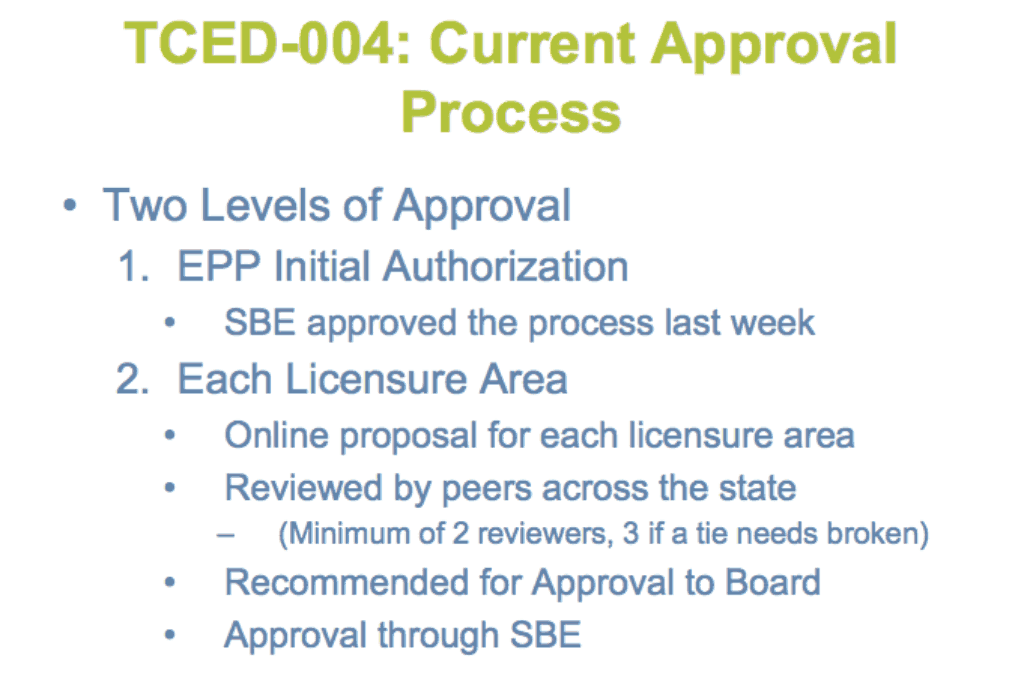

Sioberg manages the process for the Department of Public Instruction. He recommended the elimination of the current process and a replacement that would focus less on initial evaluation and more on data-driven outcomes. The changed language now reads, “Before the operation of a new program, EPPs must submit to the NCSBE for approval, an acknowledgement that programs have been internally vetted by the EPP.”
Licensure would then be evaluated by new accountability measures, described in the slides below.
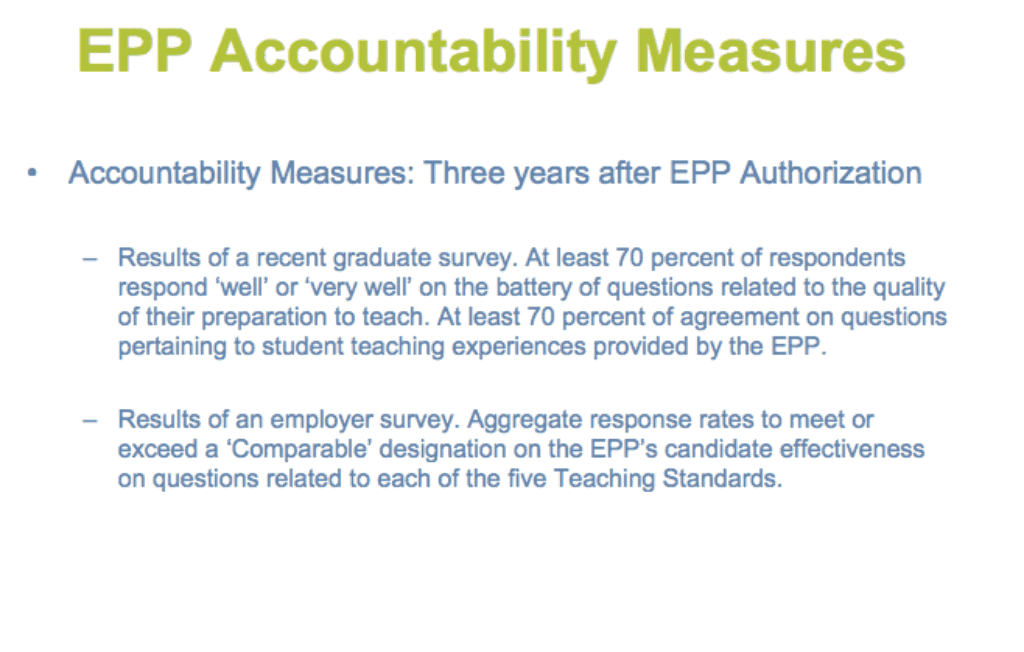

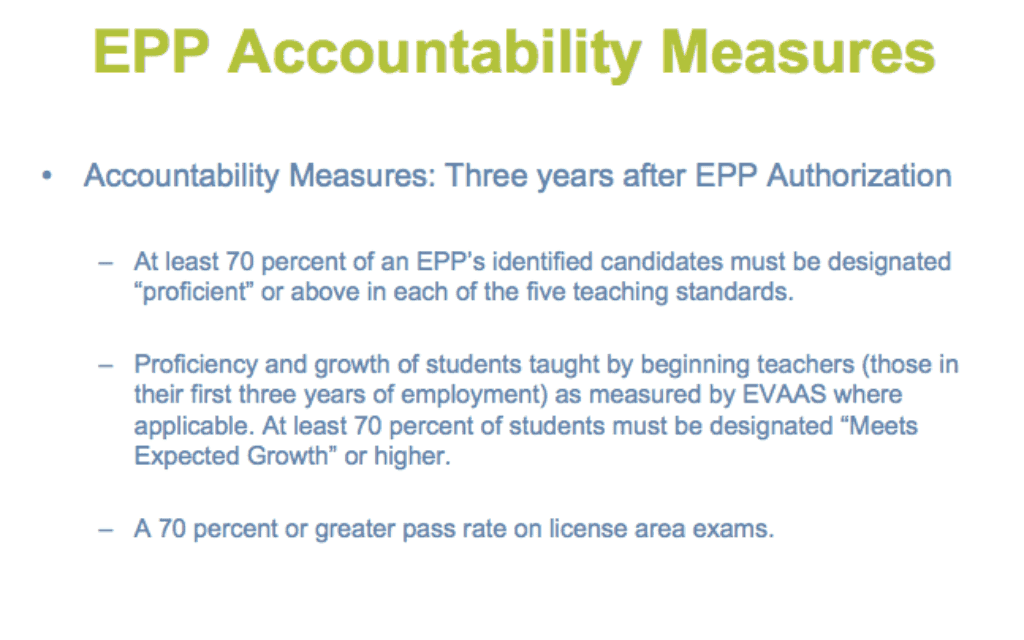

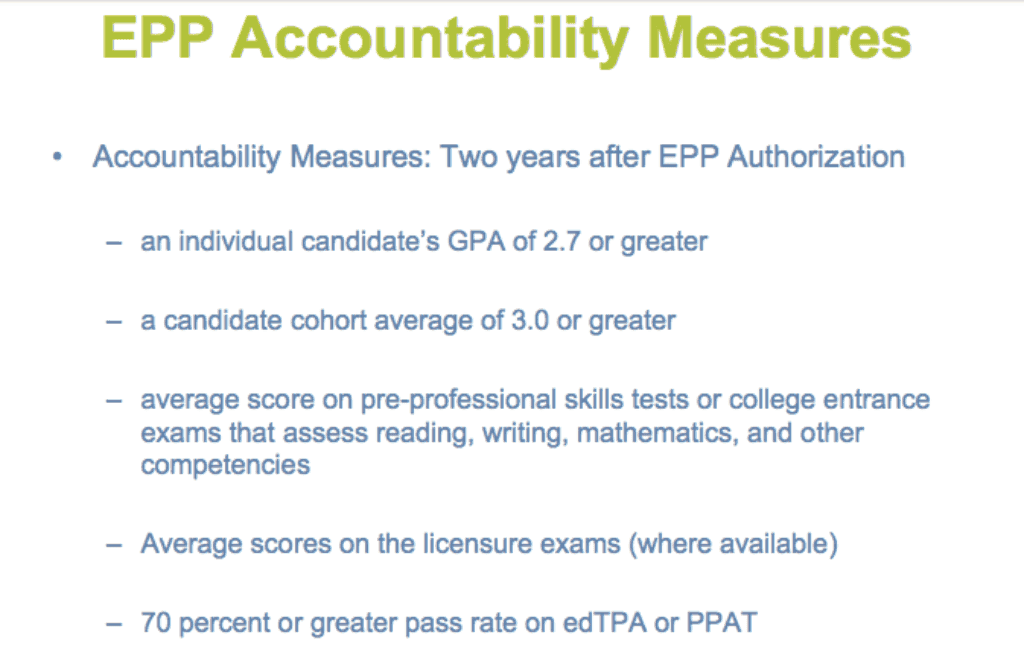

The commission voted to approve the new policies. The determination about if and how to weight the accountability measures will be made by a subcommittee.
Elementary Math licensure testing
The commission also heard from Sioberg about the possibility of changing the state’s elementary math licensure exam from the Pearson Math subtest to the ETS Mathematics Content Knowledge for Teaching (CKT) test. The department convened a team of math experts to determine if the CKT test is a better method of assessing a candidate’s preparation to teach elementary math, Sioberg said. The only other state presently using the CKT test is South Dakota, but it is under consideration in South Carolina, Tennessee, and Kansas.
The commission’s conversation about the elementary math test change involved questions about how other testing might be affected. “Are we suggesting that this will replace our current test?” Jones asked.
“I have no value judgement about either one of the two tests, But I think if we get into that arena, we have to look at the full gamut, the verticalness of all the testing we may do,” said commission member Sam Houston, president and CEO of the North Carolina Science, Mathematics, and Technology Education Center. “Is there a chain reaction related to changing any one of the assessments in the licensing process? It is a big issue. It’s not quite as simple as dealing with elementary math Praxis success rate.”
Future items
The commission amended the bylaws to creating three standing subcommittees: Educator Preparation, Licensure, and Assessment & Performance. The commission also outlined its priorities for the next few months. The next meeting of the commission is Thursday, May 10 at 9am.
Editor’s Note: Sam Houston is on EducationNC’s Board of Directors.
